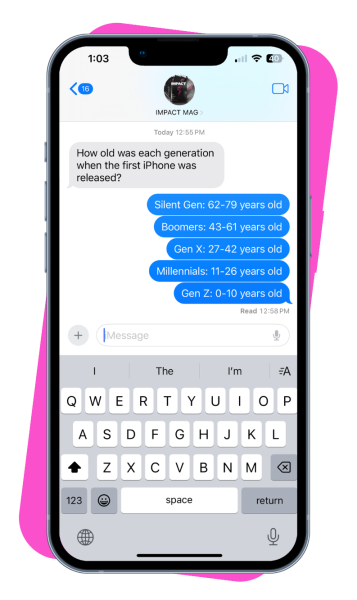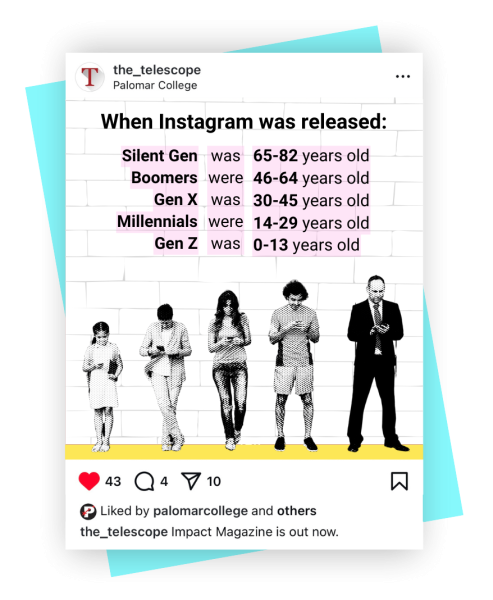Understanding what we see online is an essential skill needed for everyday life.
Some generations were born and raised with technology and others watched its creation and evolution into an essential part of our everyday lives.
The way we consume media has changed drastically within the past
50 years.
The Silent Generation in their prime consumed media through printed newspapers and radio. Baby Boomers consumed most media through the home television, the home phone, and printed newspapers. Growing up Gen X experienced the home television and the introduction of the personal computer. These generations witnessed the creation and development of media and got the opportunity to see a world without prevalent or any digital media use.
Millennials had mobile telephones and laptops with the development of social media like Myspace and Facebook. Lastly, Gen Z had access to modern technology all throughout their development such as the smartphone with access to Instagram, Youtube, and Facebook. These generations continue to see the evolution of technology but were exposed to digital media in daily life from adolescence or younger.
The rise of technology in daily life is astounding and we may not be able to function properly as a society without it as a result. However, with online media being so busy nowadays it’s not always easy to find what you are looking for.
“Online social media literacy is defined as participation, access to online social media, understanding, and awareness of the content disseminated in online social media,” according to The Political Science Association of Kasetsart University.
By understanding what media literacy means, we can discover its effects across different generations. Older generations tend to be less media literate when it comes to identifying misinformation in comparison to their younger counterparts, according to a Scientific Reports research paper.

Witnessing the Evolution
Lisette Ordorica Lasater, associate professor of English at Palomar College, is from the end of Generation X. Throughout her life, she has experienced a wide variety of different technologies. She talked about her memories growing up, reflecting on her experience learning how to type on a typewriter in middle school and getting to see the evolution of computers.
“I think it’s a challenge for a lot of young people now…they come into this slick iPad interface and they don’t necessarily always get how it works… like where’s the file storage?” Lasater said.
Currently, Lasater browses Reddit on the internet to discover current conversations, recipes, or niche interests. She has Instagram and Facebook but mostly scrolls, follows art organizations and writers, and finds out about local events.
In addition, she also uses TikTok with the motivation of staying informed on current trends to connect with students. She also has an X account but doesn’t use it anymore.
“With TikTok it’s often just very entertaining… there’s a lot of bad things about social media and online media and it has become very toxic,” she said. “I also recognize how it can be a great place for communities to form… especially during the pandemic.”
Lasater noticed communities forming in TikTok comment sections or around content creators and daily life scenarios.
When asked if she faces challenges while searching online, she said occasionally but she is confident in her level of media literacy. For internet browsers, she tended to lean towards using chrome and sometimes safari but also research databases for gathering information.
She said frequently with Google the first things that pop up are ads or sponsored content and part of the challenge is sorting through the algorithm to find the information she is looking for.
“I do a pretty good job of Identifying false information or bias information,” she said even with having to search multiple web browsers or databases.
Lasater said because of ads and disinformation she is increasingly unable to get the results she wants from looking up information online — especially when it comes to relevant information.
Evaluating Current Media
Gabriel Rosenthal, a Gen Z student from Palomar College, shares his experiences with digital media.
“I had access to the internet from a very early age, I think I got my first computer at 6 or 7 years old and it wasn’t monitored closely… Attention to media and what children are consuming should be monitored pretty closely,” Rosenthal said.
When it comes to staying updated, he mainly uses YouTube and Instagram and occasionally uses Facebook for his family. His motivations for using apps like Instagram or YouTube are for entertainment, information, news and socializing.
Nowadays, 39% of adults under 30 say they regularly get their news from TikTok, according to Pew Research Center.
Rosenthal finds it difficult to find articles online that come from a credible source.
“Google Scholar… is meant to be for The Generational Divide finding credible sources but I find that a lot of them are put behind a paywall which makes it pretty difficult to find things from a reliably credible source,” he said.
When looking for information online, he said it ultimately is 50-50 because of frustrating websites, ads, and an influx of misinformation. He expressed that he’s very frustrated with this increase of misinformation, and those who consume this content unintentionally or not.
“Digital media, in a sense, a lot of it is not quite encouraging the truth in a lot of instances and is more encouraging of what gets more interaction for more views for ads,” he said.
Rosenthal added that the media has gone through this transformation over time from being informative to being a majority of what gets the most attention according to an algorithm or wanting ads to be seen to make profit

The Generational Divide
Between these two very different individuals there are a lot of similarities but also major generational differences. A major difference was the way they grew up consuming media.
Rosenthal had major access to the internet from a very young age. Whereas, Lasater grew up with the evolution of computers being made and learning about websites for the very first time.
One commonality is that they both observed the challenges of trying to search through ads, paywalls, and algorithms in order to get to the information they need. This is a way of showing and understanding the level of media literacy of these two people.
Professor Wendy Nelson currently teaches media studies at Palomar College, which gives her professional insight on media literacy and generational differences.
“We learn so much by the messages we consume via the media. Do we have the skills to be able to discern and think critically about all of those messages?” Nelson said on the impacts of the media.
She added that being media literate also involves putting together and understanding media to shape stories. This can be through understanding and creating writing, film, or art to create a message through it.
“This is my opinion, that younger generations are more media literate.. Then y’know some older audiences only because they’ve grown up using the tools,” she said.
Nelson added that out of all the countries in the world, the U.S. ranks 15 in media literacy. Some schools are currently taking measures to address the lack of media literacy. California has become the fourth state to require media literacy for all K-12 students, according to NPR.
Her advice to students in terms of usage of digital media is to be aware that media can be distracting us from important things like homework, chores, or exercise.
Other pieces of advice she recommended was limiting time on digital media, spending more time with friends and family, and spending time reflecting with yourself and tuning in. Especially in an age of phone addictions it’s important to set healthy boundaries.
Nelson also said having an overall life balance with digital media as far as social media while also being aware of media you consume and how it may affect you on a daily basis. She emphasized the importance of critical thinking as well when finding resources online.
Looking at Everyday Life
With every day life being very hectic and crowded no matter your generation, you should pay attention to what you are consuming day to day online. Despite our generational differences, we still currently share our experiences, research, thoughts and ideas on the same internet. It is ultimately up to us to improve our ways of using media to better benefit human life.
“I don’t like it when people my age or my generation are like ‘kids nowadays are so addicted.’ It’s like we are, truly we are too. We were there from the beginning but we are all in the system now,” said Associate Professor Lisette Ordorica Lasater.







